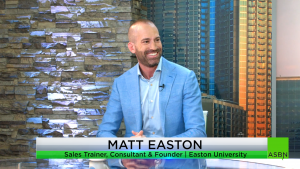When it comes to prospective buyers, you must ask the right questions. According to Matt Easton, Sales Trainer, Consultant, and Founder of Easton University, asking your buyer questions regarding the repercussions of not taking action has power. Therefore, Matt Easton joins us on today’s episode of the Small Business Show to further elaborate.
Easton says that as salespeople, “must stop selling and talk about the repercussions of not acting.” For instance, Easton’s 19-year-old daughter purchased an SUV and left it in their driveway because Easton was concerned about frequent trips between Colorado and Los Angeles. But then, the license plate lost its validity after being left idle for so long. Easton says his family tried to get him to update it, but he wasn’t receptive. As a result, he had to pay $800 in tickets, in addition to purchasing a new license plate. As salespeople, he claimed, “we spend too much time on ‘you have to do this’ and fail to take a few moments to ask the buyer to consider what might happen if they don’t do this.
Instead of asking clients the dreaded question, “what brought you in today?” Easton suggests instead, “what’s the most important thing we need to accomplish today?” He then adds, “we need to save our customers from themselves.” The bulk of the time, clients will arrive with a problem, but salespeople are trained to focus on the features, perks, and general awesomeness of everything, often ignoring the problems. As a result, Easton says, “we must emphasize the consequences of delaying action.”
"People take action because of pain." — Matt Easton
To illustrate, if a mother visits a dealership out of concern for a transmission that is nearing the end, but the salesperson is overly pushy and she becomes overwhelmed and leaves, the repercussions of her neglecting the transmission could be that she gets stranded in Atlanta traffic with four children.
Easton urges salespeople to take a different approach. For instance, he claims to be “empathetic and uses logical tonality to better help,” that doesn’t try to oversell. When you calm down and allow them to speak, they’re more inclined to open up and take action now.” When salespeople realize they need to start asking those uncomfortable questions in a skillful way, whether that individual is doing business with them or not, they will leave feeling helped and like you were watching out for their best interest. Which, according to Easton, “will pay dividends for you.”








